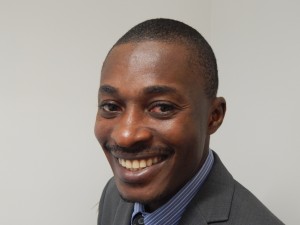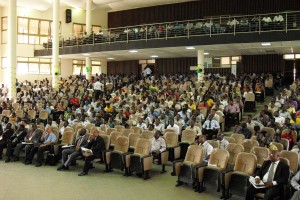Researching the politics of development
Blog

Spotlight on an ESID researcher: Daniel Appiah
 7 December 2015
7 December 2015
What is your background and how did you become involved in ESID?
I did a degree in Political Science at the University of Ghana followed by a Masters in Public Administration in Norway. I did my PHD at York University , UK, with Adrian Leftwich and it was there that I first met ESID researchers, Kunal Sen and Henry Chingaipe.
I had always wanted to go back to Ghana. My family are there and if you are specialising in politics and institutional reform, it’s very important to know how governance processes operate on the ground. I became a lecturer in public administration at the University of Ghana.
I met ESID researcher Abdulai Abdul-Gafaru at the University and we agreed to collaborate on ESID’s public sector reform project.
What is your work for ESID and what is most interesting about it?
I take a problem solving approach to research. I see my role as helping students to understand structures of public administration in Ghana, why many are not working effectively and how we can make them work better.
What areas of the public sector are not working well in Ghana?
We need competent personnel. Some civil service personnel are recruited through a merits-based system, but as politics has become competitive, we’ve seen the recruitment of the elite through connections and political networks. This weakens the capacity of the civil service to effectively formulate and implement policy.
Part of the blame lies with public universities. There are huge numbers of students, and too few lecturers. A lecturer will have 500-600 students, so exams become multiple choice, because it would be impossible to mark so many essays and give one-to-one feedback. Students do a degree without ever writing an essay.
These students cannot be expected to critically analyse the problems that the public sector faces. Universities need to provide well trained graduates with sharp analytical abilities to help our government move forward.
government move forward.
Our ESID research does suggest, however, that there are ongoing reforms to address some of these problems. One of these is tracking the number of people employed in the public sector.
What’s happening in Ghana’s development domain?
There is little locally-owned development focus driving public sector reform. Reform projects are largely driven by donors and foreign consultants, who may have little knowledge of the key problems and also little incentive to design long-term development objectives. There can also be a lack of coordination and cooperation between donors.
In recent years there has been an attempt to have a clear development focus for Ghana. An organisation called the National Development Planning Commission are working on a long-term development focus, around which the public agencies can be well organised to drive forward Ghana’s development and here too DIFD is coming in with its support.
ESID’s research programme has also been beneficial to the Ghana DFID team, helping them to see gaps they didn’t see initially.
What’s happening in Ghana’s health domain?
My wife is a midwife and the public health sector is one of the few well-functioning areas in Ghana. But there is also a problem here of donor-driven reforms that aren’t linked to long-term efforts to recruit competent health personnel.
Currently there is a donor-funded programme that trains high-school graduates to become health assistants, but the length and content of the syllabus is not up to the standard of the traditional training given to nurses.
As one of the well-functioning sectors in Ghana, the health domain needs to have serious attention paid to it, so that it doesn’t also deteriorate.
What are some of the key challenges for inclusive development in Ghana?
The constitution gives too much power to the president to elect the elite of the public service. Every new president comes in with his own party and wants to fill positions with his own party loyalists. This prevents continuity and at the same time competent personnel from the previous government are sidelined.
Development and politics has become an exclusive club for the government. I recently gave an assignment to students to speak to senior-level civil servants about the problems within the sector.
Interestingly, all students came back with the same feedback, which was that people are afraid to speak up without the go ahead from a chief officer or minister. Unless this is addressed, there is no way that Ghana’s development will become sustainable.
How do you like to spend your spare time?
Life has been a continuous process of education and academia, with little time to stop. One of the professors wrote in the recommendation for my PhD application, ‘He is very good, but whoever supervises him should pay attention to the lack of balance between academic work and socialising’. I told him he was spot on!
I have two children aged 5 and 2 and I enjoy travelling abroad with my wife to visit family. I also love farming and I miss it. I grew up on a farm and farmed with my parents. I love being an academic though, and being involved in ESID research has inspired me to stay in academia long term.
